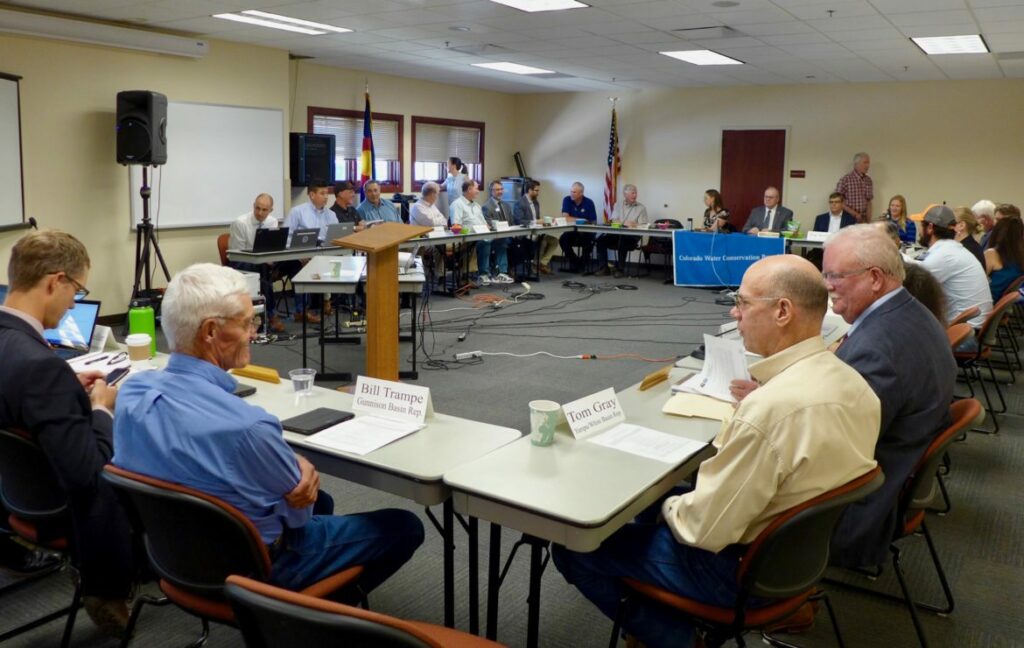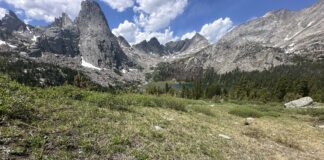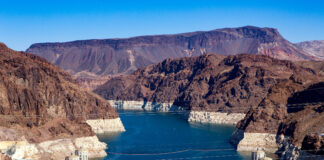
By Brent Gardner-Smith, Aspen Journalism
LEADVILLE — After a week filled with pushback from water managers and users, especially on the Western Slope, the director of the Colorado Water Conservation Board has decided to hold upcoming workgroup meetings about a potential water-demand management effort in public and will no longer ask the workgroup volunteers to sign non-disclosure agreements or always meet behind closed doors.
“The CWCB will adjust course and move forward without requesting that workgroup participants sign any disclosure agreements,” director Becky Mitchell said in an update on the workgroup process released Sunday. “Additionally, the workgroup meetings will be open to members of the public, with an opportunity for comment.”
But Mitchell also reserved the option to shield from public view sensitive information and discussions that came up during the process.
“As appropriate and dependent on the relevance of the workgroup discussion to interstate considerations, a non-disclosure setting may be necessary for elements of particular workgroup subject-matter discussion,” Mitchell wrote.
Mitchell said it was most likely that sensitive information would come up in the law and policy workgroup, which includes eight current or former water attorneys.
CWCB staff members, working closely with lawyers in the attorney general’s “defense of the Colorado River” subunit, have been crafting a process for months to investigate the feasibility of a “voluntary, temporary and compensated” demand-management, or water-use reduction, program in order to stay in compliance with the 1922 Colorado River Compact.
The CWCB intends to set up eight workgroups, each exploring a different aspect of a potential demand-management program in Colorado: law and policy; monitoring and verification; water-rights administration and accounting; environmental considerations; economic considerations and local government; funding; education and outreach; and agricultural impacts.
Each workgroup is slated to meet four times over the next year, meaning there could be 32 workgroup meetings.
“The workgroups are kind of an extension of staff at this point. That’s how we’re seeing them,” Brent Newman, the head of CWCB’s section on Colorado River issues, told the CWCB directors in May. “They’re here to help inform staff about these solutions from a more technically diverse perspective. And then we’re going to bring those solutions to you guys.”
Asked whether CWCB directors should attend the closed-door workgroup meetings, Newman advised against it.
“When you have a decisionmaking body like this board, having you all directly participate in some of the conversations of these working groups, it contravenes some open-meeting requirements, and we don’t want to do that,” Newman said.
The open-meetings law says that if two or more officials of a state public body, such as the CWCB, attend a meeting, then it’s a public meeting.
Steve Zansberg, an attorney at Ballard Spahr in Denver, is an expert on the state’s open-meetings law and the president of the Colorado Freedom of Information Coalition.
He said advisory committees, such as the CWCB’s proposed workgroups, are considered public bodies subject to the open-meetings law if they are appointed directly by the members of a public body, such as the CWCB directors.
But if staff members form such committees and if the committees report directly to staff members and not to a board, then they may meet behind closed doors.
“They are probably being very crafty and careful, and with the advice of the attorney general’s office, trying every which way to set these workgroups up as not being public bodies, and they are probably succeeding,” Zansberg said Friday, before Mitchell at the CWCB had changed course and opened up the meetings, or at least most of them.
Zansberg also said the Colorado Supreme Court stated in a 2008 case, Town of Marble v. Darien, that “the open-meetings law prohibits bad-faith circumvention of its requirements.”
“I’m not going to ascribe bad faith here, but it is an effort to evade or circumvent the requirements of the open-meetings law,” he said of the CWCB’s staff-meeting approach.
During the River District’s quarterly meeting in Glenwood Springs last week, the district’s general manager, Andy Mueller, brought up the CWCB’s proposed workgroup process with his board of directors, who represent 15 Western Slope counties.
Some of the directors voiced strong opposition to the CWCB’s requirement of a non-disclosure agreement and closed-door meetings, and unanimously passed a motion asking the CWCB to explain its process.
“In all my years of participating in policymaking at the state level, at the local level, I’ve never seen anything like this,” said Steve Aquafresca, who represents Mesa County on the River District board and is a former Mesa County commissioner and a former state legislator.
Marc Caitlin, a state legislator and the Montrose County representative on the River District board, said, “This idea of putting this behind closed doors, putting a gag in your mouth and having us be surprised, so wonderfully surprised, when this comes out is not going to make sense to me. I can’t believe that the CWCB believes that they can actually pull this off.”
He added: “I can’t believe the attorney general would even go along with this.”
Colorado Attorney General Phil Weiser explained his support for the CWCB’s process in a July 8 memo to the CWCB board.
He said the proposed non-disclosure agreement was meant to “strike a balance between the need for the CWCB to lead the investigative process in a manner that considers and protects the state’s ongoing strategies in interstate forums” while also “honoring the roles and perspectives of the subject-matter experts” asked to participant in the workgroups.
The first version of the CWCB’s non-disclosure agreement — a six-page “confidentiality agreement” — ran into opposition from many invited workgroup members when it was released in June.
In July, a second proposed agreement — this time labeled as a “disclosure agreement” — was circulated. It was shorter but still contained two key provisions from the first proposal.
First, participants needed to agree to not attribute anything said in the closed-door workgroups. Second, the participants couldn’t share in a public setting what was said at the workgroups unless they got permission from the CWCB.
The 74 invited participants are still being asked to volunteer as individuals and “subject-matter experts,” and not as representatives of their organizations or clients, which also troubled some River District board members.
On Thursday, during a CWCB meeting in Leadville, Mueller told the CWCB directors that the River District board was seeking an explanation about the process, and that he and his staff could not participate until his board had learned more.
Mueller made his comments shortly after the CWCB directors held a long and unscheduled executive session to discuss the non-disclosure agreements.
CWCB chair Heather Dutton, who represents the Rio Grande River basin, responded by saying the board’s position on the workgroup process was still evolving.
Also during the meeting, the CWCB had invited the members of the state’s Interbasin Compact Committee to join them at the table to discuss aspects of demand management.
And Bill Trampe — a rancher from the upper Gunnison River basin who serves on the IBCC, the Gunnison Basin Roundtable and the River District board — told the CWCB board members that their approach to the workgroup process was raising a lot of questions about demand management among his constituents on the Western Slope.
“Everybody is starting to think about how they might participate, because they like the voluntary, compensated, temporary part,” Trampe said. “And they recognize the fact that we probably better show up and participate in some fashion, so that our brethren on the east side of the mountain will also be willing to participate.
“But we know it’s going to hurt us like heck if we participate very deeply, and we’re trying to figure out how we can do it. And we feel like we’ve been shut out of this initial process. If you’re going to go behind closed doors and develop these ideas, we feel that that’s the wrong way to do it, that it should be open from the very beginning, and we can’t figure out why these different workgroups have things that they think they need to do behind closed doors.”
On Friday, Mitchell issued a workgroup update that said the non-disclosure agreements had been eliminated and that the meetings would be public.
That update took a softer approach to the remaining potential need for closed-door meetings and agreements to not discuss sensitive information, saying “each of the groups will work with CWCB staff to develop expectations around participation and communication in this effort.”
On Sunday, she issued a revised update that did not include that statement but did include the new provision that some meetings could still occur, if necessary, in a “non-disclosure setting.”
In response the overall course change by the CWCB, the River District said, “We look forward to working with CWCB as they move forward with this important public-policy process. And we appreciate the deliberation that went into considering how the workgroups will do their work.”
Aspen Journalism covers rivers and water in collaboration with The Aspen Times and other Swift Communications newspaper. The Times published a version of this story on Monday, July 22, 2019.
The Water Desk’s mission is to increase the volume, depth and power of journalism connected to Western water issues. We’re an initiative of the Center for Environmental Journalism at the University of Colorado Boulder. The Water Desk launched in April 2019 with support from the Walton Family Foundation. We maintain a strict editorial firewall between our funders and our journalism. The Water Desk is seeking additional funding to build and sustain the initiative. Click here to donate.





